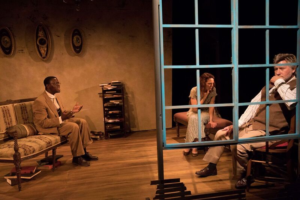
 [rating=5]To fully be understood by another person is impossible, but we’ve all had times when what we wanted more than anything was to be seen. When psychology was in its infancy, the great Italian playwright and short story author Luigi Pirandello was already grappling with this contradiction. Later, his interest in the mutability and context-dependent nature of identity would inspire the experimental theatre of Eugene Ionesco and Maria Irene Fornes, but his 1922 drama Vestri gli ignudi (Clothing the Naked or just Naked) presented characters who were basically realistic, albeit somewhat farcical. In that regard, it is a bit of an unusual pick for Trap Door Theatre, one of Chicago’s most distinctive black box treasures. But thematically, it is right up their alley, and the production directed by Kay Martinovich is a madcap dark comedy as well as a psychological inquiry.
[rating=5]To fully be understood by another person is impossible, but we’ve all had times when what we wanted more than anything was to be seen. When psychology was in its infancy, the great Italian playwright and short story author Luigi Pirandello was already grappling with this contradiction. Later, his interest in the mutability and context-dependent nature of identity would inspire the experimental theatre of Eugene Ionesco and Maria Irene Fornes, but his 1922 drama Vestri gli ignudi (Clothing the Naked or just Naked) presented characters who were basically realistic, albeit somewhat farcical. In that regard, it is a bit of an unusual pick for Trap Door Theatre, one of Chicago’s most distinctive black box treasures. But thematically, it is right up their alley, and the production directed by Kay Martinovich is a madcap dark comedy as well as a psychological inquiry.
The story begins with Ersilia Drei (Tiffany Bedwell), a young woman recently turned out onto the streets, being ushered into the apartment of the famous writer Ludovico Nota (Bob Wilson). This being Rome in 1922, the landlady (Manulea Rentea) is extremely unhappy with the impropriety of this, but Ms. Drei’s is a special case. She was just released from the hospital after a suicide attempt, and her meant-to-be-dying statement was a sensation in the newspaper. Mr. Nota explains that he took pity on her and is lending her his room as a good deed. Of course, if she would provide inspiration for his next story, that would be more than sufficient repayment.
Ms. Drei is pleased by the attention, but much less so when Mr. Nota says he will likely change some details for dramatic effect or out of personal preference. She’s even more troubled by the realization that he was in love with a false version of her that he’d imagined. But they aren’t left in peace for long, anyway. Ms. Drei’s story implicated several other people in a scandal, and they soon find their way to Nr. Nota’s apartment incensed or self-recriminating, but beneath it all, more than a little thrilled to be the subject of a tragedy. Even the landlady changes her tune when given the chance to make herself a supporting character and play the doting mother.
But what exactly happened? That only comes out piecemeal, and we’re not sure whether we can believe any of it. Kay Martinovich keeps the action zipping along so that it clocks in at a lean one hundred minutes, but the actors do full justice to the eloquence of Nina DaVinci Nichols’s translation. The characters formally refer to each other by prefixes and impress their dignity upon each other while trying to exploit a really quite ghastly incident involving multiple ruined marriages and the death of a child. Ambrose Cappuccio and Darren Hill play men from Ms. Drei’s past whose vacuity makes for some jaw-dropping displays of arrogance that inspire laughter and pity in equal measure. Keith Surney plays a reporter whose two-faced gossip matches that of Rentea’s landlady and Nora Lise Ulrey’s maid, though only the maid forgoes a mask of principled benevolence. And then there’s Bedwell’s Ms. Drei; nervous with anticipation, intuitive about people but abashed to be among intellectuals, often contradicting herself from one sentence to the next. She’s a person other people can easily incorporate into their fantasies about themselves, making them not want to look to closely at what’s really there.
“My dear sir, facts are whatever I take them to be.” That quote comes from Mr. Nota, a brilliant creation of actor Bob Wilson’s, and it perfectly captures him. The design team (props by Jacqueline Frole, sound by Evan Forbes, lighting by David Goodman-Edberg, scenery by Nicholas James Schwartz, costumes by Rachel Sypniewski, and makeup by Zsófia Östvös) has created a room that is his sanctuary amid a chaotic, rapidly-changing world. Outside, a man or woman may fall victim to a random accident, but in here, with his piles of newspapers, his phonograph playing La Traviata, and his writing desk, he spins tales that appeal to his own sense of tragic beauty. His Norman Mailer-like stunt with Ms. Drei allows him to show that he is a snake who is vaguely aware of what he is but is untroubled by it. Naked is a hilarious and timely examination of how we interpret people to reflect the stories we want to believe about ourselves. But, particularly if you see him as a stand-in for Pirandello, Mr. Nota is a reminder that there is nothing new about our interpretations being influenced by presenters in ways we aren’t cognizant of, and where that can lead.
Naked runs through October 27 at Trap Door Theater, 1655 W Cortland, Chicago. Parking is available in the neighborhood.
Running time is one hundred minutes.
Performances are
Fridays: 8:00 pm
Saturdays: 8:00 pm
Tickets are $20-25, with 2-for-1 admission of Thursdays.
To order, call 773-384-0494 or visit Trap Door Theatre.
To see what others are saying, go to Theater in Chicago, go to Review Round-Up and click at “Naked”.







More Stories
“The Last Five Years” MILWAUKEE
“The Trial of Themistocles” reviewed by Julia W. Rath
“Titanique”